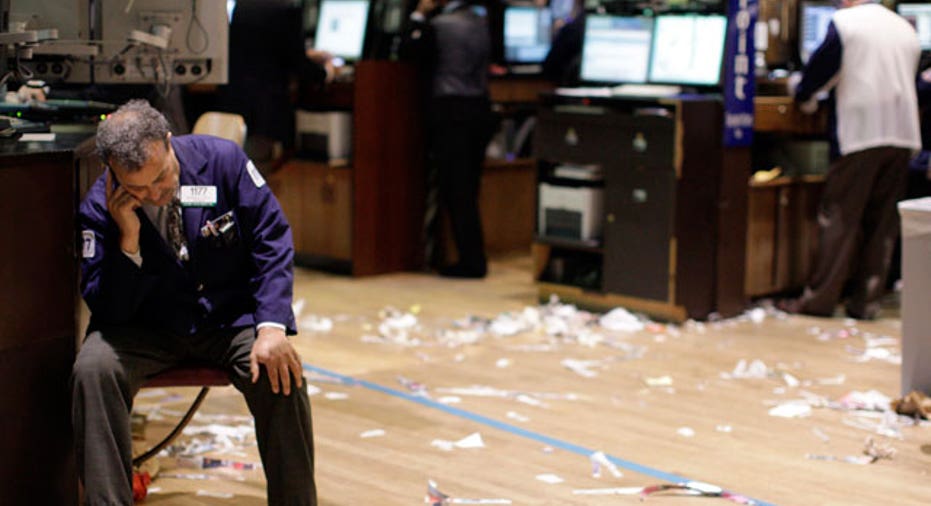August: A Month to Remember on Wall Street

There is one word few market participants would use to describe the last full month of summer: relaxing. Wall Street was roiled by political, economic and financial turmoil that set off a stomach-churning chain of deep selloffs and steep rallies.
The blue chips shed 4.36% over the course of the month, while the broader S&P 500 index crumbled 5.68%. The month started with a bang after Standard & Poor's shocked traders with an unprecedented downgrade of U.S. sovereign debt, and the four-week period got even wilder as volatility in equities sent traders rushing to safe-haven assets like gold and U.S. bonds.
The downgrade launched a consumer and corporate “shockwave” that reverberated throughout the month, D.A. Davidson Chief Investment Strategist Fred Dickson said, noting that in a sign of the uncertainty “businesses found themselves momentarily seeing orders being cancelled as a result of what happened in Washington."
August marked the fourth month of the Dow's losing streak in which the blue chips have plunged close to 10%. Last month's performance was also the worst on a point and percentage basis for the benchmark average since May 2010 when it tumbled 871.98 points, or 7.92%, and represented the worst August in almost a decade.
Still, there were bright spots amid the tumult. The biggest gainers of the 30 blue chips in August were: McDonald’s (NYSE:MCD), Coca-Cola (NYSE:KO), Procter & Gamble (NYSE:PG), Verizon Communications (NYSE:VZ) and Kraft Foods (NYSE:KFT). Dickson said this reflects an appetite for safer companies.
The worst performers were: Hewlett-Packard (NYSE:HPQ), Bank of America (NYSE:BAC), Alcoa (NYSE:AA), Walt Disney (NYSE:DIS) and United Technologies (NYSE:UTX).
While H-P announced major restructuring plans and Bank of America faced continued mortgage pressures, Dickson said other losses on the Dow likely reflected cyclical impacts such as weak earnings or tepid forecasts, as well as fears over a global economic slowdown.
Global Stock Markets Pummeled in August
The Dow's monthly performance, while very weak, actually topped global markets overall. Indeed, the Dow Jones Global Titans 50 Index, a measure of the world’s largest multinational companies, plunged 6.67% in August to 170.87, pushing it down 3.52% year to date.
August was a “topsy-turvy month,” Davidson said, chalking up the Dow’s outperformance to investors seeking shelter in safer stocks amid global economic uncertainty and a migration to the U.S. from Europe as fears heightened over the sovereign debt crisis on that side of the Atlantic.
The Dow Jones Europe Titans 80 Index, which measures 80 of the most significant companies in developed European countries, plummeted 10.67% in August to 1,396.64, pushing it 7.59% lower on the year.
The Dow Jones Eurozone Titans 80 Index, a gauge of big stocks in 11 euro zone countries , fell a steeper 13.35% in August to 1,340.98, lowering it 10.98% since January.
European markets were hit hard late in the summer as fears mounted over the region’s debt crisis. Euro-zone firms grew slower than expected in July, and investors drove borrowing costs for Italy and Spain to 14-year highs on concerns that the crisis would spread from small economies like Greece to larger ones. Several countries, including those two, even imposed restrictions on short-selling, which is a bet that a particular stock will fall.
“Europe had extreme concern about the European banking crisis and the sovereign debt crisis,” Dickson said, noting global investors tend to lower their exposure to European stocks when things start to go awry.
“Money flowed out of European equities into other global markets, and some of that came back to the U.S.,” he said.
The Dow Jones Asian Titans 50 Index slid 8.01% in August in 127.20. So far this year the index has shed 12.70%, the worst-performing regional index.
Utilities Buck the Trend Lower, Auto-Part Makers and Financials Take Biggest Plunge
By sector, the Dow Jones U.S. Utilities Index climbed 1.06% last month, making it not only one of the biggest sector winners but also one of the only Dow indexes to pull off a gain in August. Investors may have rushed to utilities in a defensive play, Dickson said, noting that as interest rates fall, utilities tend to appear more attractive to traders with their higher dividend yields.
While the globally-measured Dow Jones Food & Beverage Titans Index lost 1.69% during the month, its loss was much narrower compared to many other sectors on the Dow. Dickson said that was partially because of a weakening in investors’ risk appetite during the month and the view of food as a safe haven.
It also seemed efforts implemented earlier this year by food and beverage companies to adapt to rising raw materials costs started to pay off late in the summer. Kraft (NYSE:KFT) and Starbucks (NASDAQ:SBUX) both raised prices this year and each revealed a stronger quarterly profit in August.
Besides U.S. utilities, all other sectors weakened during the month, with the hardest hit companies in the automobile industry. The Dow Jones World Automobiles & Parts Titans Index posted the biggest loss of 15.26%.
“Autos and a number of retail stocks probably reflected some concern about a drop in consumer confidence and possibility of a future drop in consumer spending coming after the very significant political problems we saw in the beginning of the month in Washington,” Dickson said.
Autos were followed closely by the Dow Jones Europe Financial Index, which posted the second-steepest decline of 14.73%, the Dow Jones Asia/Pacific Oil & Gas Index, dropping 11.3%, and the Dow Jones U.S. Oil & Gas Index, which slipped 10.42%.



















